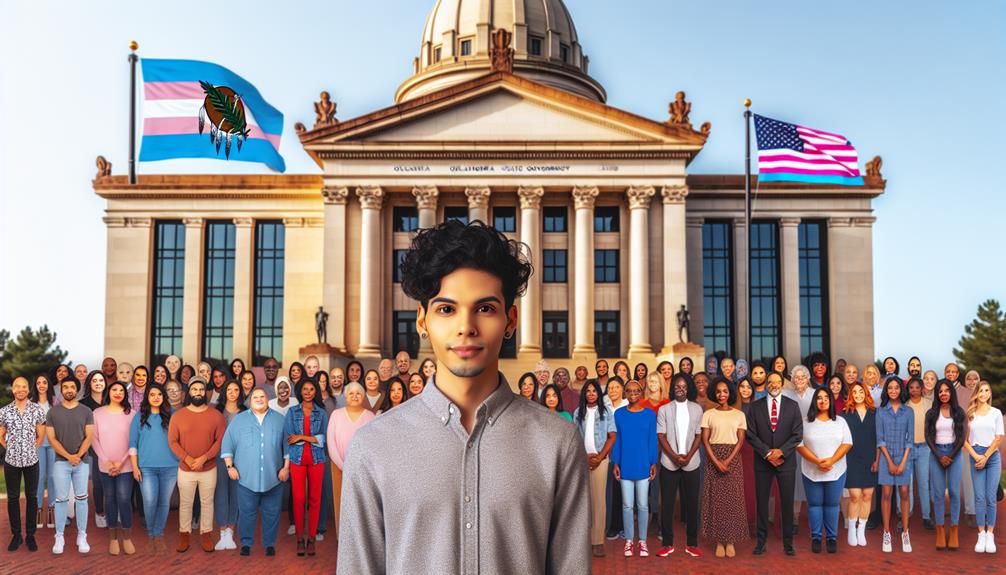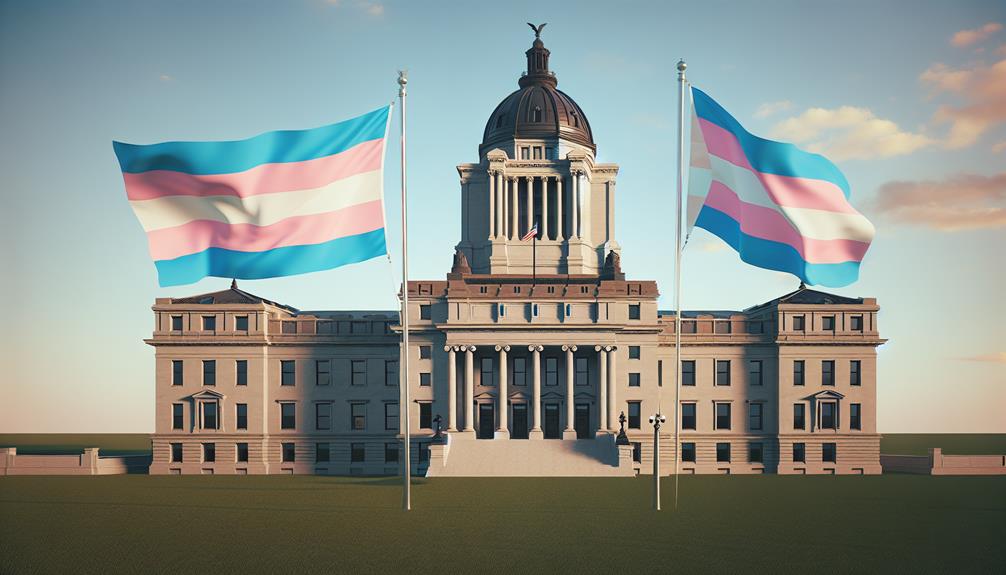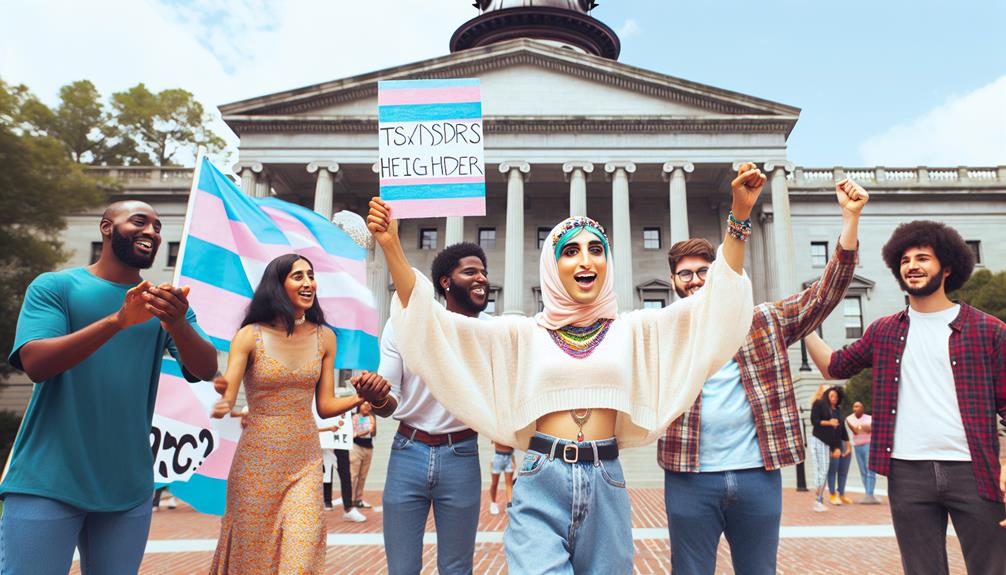
Michigan's transgender community faces a changing landscape. Learn about the current state of affairs and how it impacts the lives of transgender individuals in Michigan.
Table of Contents
ToggleMichigan Transgender State of Affairs
Michigan’s transgender state of affairs is a complex and compelling topic, particularly in light of recent legal developments.
With the Court of Appeals making strides in recognizing transgender individuals as protected under the Ethnic Intimidation statute, the conversation surrounding the rights and challenges faced by the transgender community in Michigan has gained renewed importance.
From legal protections to healthcare access, workplace discrimination, education, and community advocacy, there are multifaceted aspects that demand attention and consideration.
As Michigan moves forward in addressing these issues, it’s crucial to understand the current landscape and the potential implications for the transgender community.
Key Takeaways
- Michigan has made progress in legal protections for transgender individuals, with the Supreme Court interpreting the Elliott-Larsen Civil Rights Act to prohibit discrimination based on sexual orientation and gender identity.
- However, there are ongoing challenges, such as bills introduced that could criminalize medical professionals providing gender-affirming care to individuals under 18.
- Attorney General Dana Nessel has been a vocal advocate for transgender rights and has opposed discriminatory legislation targeting transgender youth through legal advocacy.
- Transgender individuals in Michigan face obstacles in accessing necessary healthcare and experience discrimination in the workplace, highlighting the need for inclusive policies and protections.
Legal Protections for Transgender Individuals
Despite ongoing legal debates and controversies, Michigan’s transgender community continues to face challenges in obtaining legal protections.
The Michigan Supreme Court recently made a significant ruling by interpreting the Elliott-Larsen Civil Rights Act to prohibit discrimination based on sexual orientation and gender identity. This decision marked a pivotal moment for LGBTQ+ rights within the state, providing a glimmer of hope for the community.
However, the landscape remains complex, with the introduction of bills that could criminalize medical professionals for providing gender-affirming care to individuals under 18. The legal debates around regulating medical treatment for transgender individuals have sparked intense controversy, creating a divisive environment among advocates and lawmakers.
Attorney General Dana Nessel has been a vocal advocate for trans rights, but challenges persist as the state grapples with conflicting perspectives on gender-affirming care.
Efforts are underway to make Michigan a safer and more inclusive space for the transgender community, with a focus on advocating for gender-affirming care and increasing protections, particularly for trans people of color in Wayne County.
The journey towards legal protections for Michigan’s transgender population is one marked by both progress and obstacles.
Healthcare Access and Challenges
Amid debates and legislative proposals, the healthcare access for transgender individuals in Michigan remains a pressing and contentious issue.
The state has introduced bills that could criminalize medical professionals providing gender-affirming care to individuals under 18, potentially limiting access to essential treatments such as puberty blockers and gender reassignment surgeries. This reflects a broader trend, with 556 anti-trans bills introduced across the U.S., raising concerns about healthcare access and rights for transgender individuals.
Michigan’s proposed legislation has sparked debates about the necessity of gender-affirming care for trans youth and their ability to access such care. Despite some progress, including allowing the X gender indicator on state IDs and driver’s licenses, challenges and debates around healthcare access persist.
The current climate in Michigan poses significant challenges for transgender individuals seeking necessary healthcare, and it remains to be seen how these debates and legislative proposals will impact their access to gender-affirming care. These issues highlight the ongoing struggle for transgender individuals to access necessary healthcare without facing discrimination or barriers such as conversion therapy.
Workplace Discrimination and Equality
The ongoing debates and legislative proposals regarding healthcare access for transgender individuals in Michigan have brought attention to the issue of workplace discrimination and equality for the LGBTQ+ community.
- Transgender people face significant challenges in the workplace due to discrimination based on their gender identity. This discrimination can manifest in hiring practices, promotions, and even termination.
- The LGBTQ+ community advocates for workplace equality, pushing for inclusive policies and nondiscrimination protections. Efforts are being made to ensure that individuals are judged based on their qualifications and performance, rather than their gender identity.
- Medical care is a crucial aspect of workplace equality for transgender individuals. Access to gender-affirming healthcare, including hormone therapy and gender confirmation surgeries, is essential for their well-being and ability to fully participate in the workforce.
- Michigan’s recent strides in LGBTQ+ rights, such as allowing the X gender indicator on state IDs and codifying LGBTQ+ rights within the law, reflect a growing awareness of the importance of workplace equality. However, ongoing efforts are necessary to combat discrimination and ensure a fair and inclusive work environment for all.
Transgender Youth and Education
Transgender youth in Michigan face significant challenges and debates surrounding access to gender-affirming care and their rights in educational settings. The state has seen legislative activity targeting transgender youth, with bills aiming to restrict access to sports, silence LGBTQ+ teachers and students, and block gender-affirming care.
Michigan has introduced legislation that would criminalize medical professionals for providing puberty blockers and gender reassignment surgeries to individuals under 18. This has sparked debate on the necessity of gender-affirming care for the mental and physical health of trans youth.
At the same time, efforts are being made to make Michigan a sanctuary for gender-affirming care and provide more protection for trans people, especially those of color. Governor Gretchen Whitmer’s administration has also made updates to better serve trans and genderfluid individuals, such as allowing the X gender indicator on state IDs and driver’s licenses.
The Court of Appeals has become a critical battleground for LGBTQ+ rights, and the ban on care for transgender youth is a contentious issue being closely watched by advocates and educators alike.
Community Support and Advocacy
Advocates and organizations in Michigan have been working to provide essential support and resources for the transgender community, particularly in light of recent legislative challenges. This support has been crucial, especially considering the increase in anti-trans bills introduced during the 2023 legislative session. Here’s how the community support and advocacy efforts in Michigan are making a difference:
- Legal Protections: Michigan has codified LGBTQ+ rights within the law, which will go into effect after the 2023 legislative session ends. This provides legal protections for the transgender community and is a significant step forward.
- Transgender Michigan: This organization provides advocacy, support, and education for transgender and gender non-conformist communities. Notably, they offer the first toll-free transgender help line in the country, making essential support accessible to those who need it.
- Government Support: Michigan Governor Gretchen Whitmer’s support, including the allowance of the X gender indicator on state IDs and driver’s licenses, has contributed to creating a safer space for trans people in the state.
- Legal Advocacy: Michigan Attorney General Dana Nessel has been actively involved in advocating for transgender rights. Nessel has joined other attorneys general in opposing discriminatory legislation targeting transgender youth in other states, emphasizing the importance of advocacy at a legal level.
Frequently Asked Questions
Is It Illegal for a Man to Use a Women’s Restroom in Michigan?
Yes, it’s illegal for a man to use a women’s restroom in Michigan.
This law aims to address public safety and privacy concerns.
It also helps prevent gender discrimination and aligns with cultural norms.
These measures are important for promoting social acceptance and ensuring a safe and inclusive environment for everyone.
Can You Legally Change Your Gender in Michigan?
Yes, in Michigan, individuals can legally change their gender. The process involves filing a petition with the court, providing documentation of medical evidence, and obtaining court approval.
This includes a name change and updating the gender marker on legal documents. The individual must also meet specific documentation requirements, such as medical records or a letter from a healthcare provider.
The legal process aims to ensure the individual’s gender identity is accurately reflected in official records.
What Is the Michigan Law About Pronouns?
In workplaces, schools, and public spaces, using correct pronouns is crucial for creating an inclusive environment. It’s essential to respect individuals’ pronoun choices in healthcare settings and legal documents.
Understanding pronoun etiquette is essential for social interactions. Pronoun recognition fosters a sense of belonging and respect for transgender and gender non-conforming individuals.
Being mindful of pronoun sensitivity can help cultivate a more supportive and inclusive community for everyone.
Final Thoughts
The recent ruling by the Michigan Court of Appeals is a step in the right direction for transgender rights. It’s a ray of hope for the community, shining a light on the need for inclusive legislation and court decisions.
This decision is a rainbow in the storm, signaling progress towards a more equal and accepting society for transgender individuals.
Let’s continue to advocate for their rights and work towards a brighter future for all.
Profile Author / Editor / Publisher
- Dora Saparow
- Dora Kay Saparow came out in a conservative Nebraskan town where she faced both misunderstanding and acceptance during her transition. Seeking specialized support, she moved to a big city, where she could access the medical, legal, and social resources necessary for her journey. Now, twelve years later, Dora is fully transitioned, happily married, and well-integrated into society. Her story underscores the importance of time, resources, and community support, offering hope and encouragement to others pursuing their authentic selves.
Latest entries
 News and AdvocacyNovember 14, 2025Rainbow Victories: 2025’s Most Pro-LGBTQ+ States Revealed
News and AdvocacyNovember 14, 2025Rainbow Victories: 2025’s Most Pro-LGBTQ+ States Revealed News and AdvocacyNovember 14, 2025Transgender Sanctuary States: Protecting Rights, Providing Hope
News and AdvocacyNovember 14, 2025Transgender Sanctuary States: Protecting Rights, Providing Hope Featured PostsNovember 13, 2025When Restroom Policing Backfires: The Hotel That Went Too Far
Featured PostsNovember 13, 2025When Restroom Policing Backfires: The Hotel That Went Too Far Featured PostsNovember 13, 2025Sex, Safety, and Seduction: A Trans Girl’s Guide to Hookups
Featured PostsNovember 13, 2025Sex, Safety, and Seduction: A Trans Girl’s Guide to Hookups


























